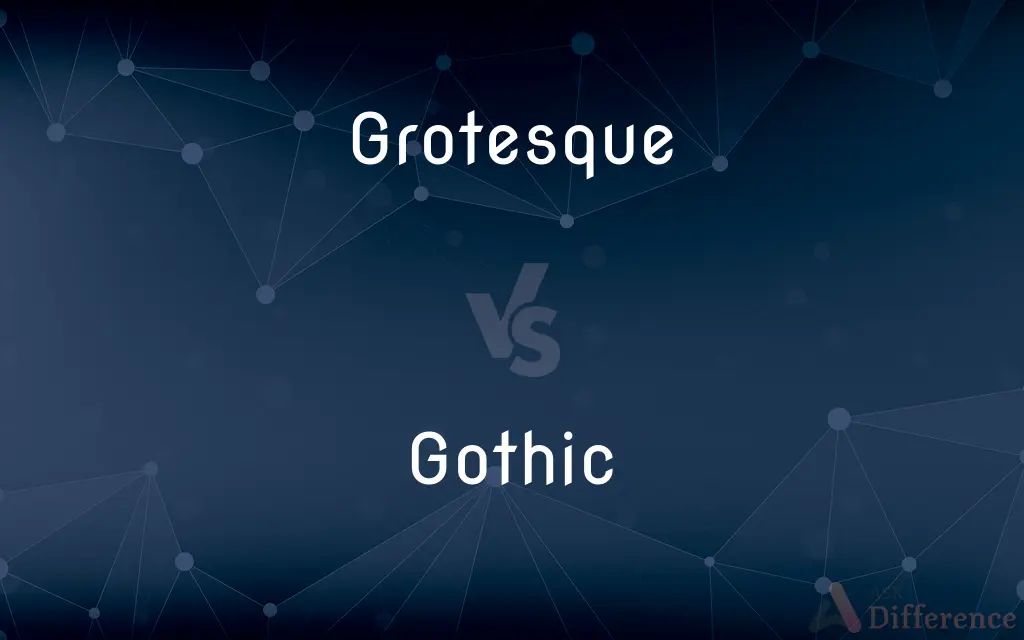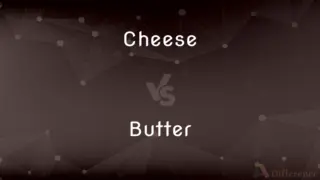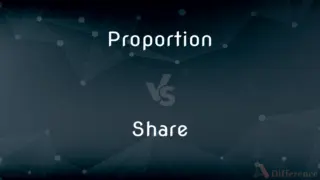Grotesque vs. Gothic — What's the Difference?
Edited by Tayyaba Rehman — By Maham Liaqat — Updated on May 3, 2024
Grotesque art often features bizarre or absurd figures, emphasizing distortion and exaggeration, whereas Gothic art is marked by dark, mysterious, and often macabre elements, reflecting a fascination with medieval styles and themes.

Difference Between Grotesque and Gothic
Table of Contents
ADVERTISEMENT
Key Differences
Grotesque art primarily engages with exaggerated and distorted forms that can be eerie or comical, showcasing the odd or unnatural. In contrast, Gothic art delves into a somber aesthetic, highlighting the dark and mysterious aspects of medieval and romantic influences.
Grotesque can be found in literature, visual arts, and architecture, often characterized by a fusion of human and animal elements to create fantastical creatures. Gothic, on the other hand, is distinguished by its dramatic and melancholic ambiance, often seen in literature, architecture, and visual arts that evoke a sense of the sublime and the terror.
The intention behind grotesque is often to provoke thought or humor through bizarre representations that challenge conventional norms. Meanwhile, Gothic art aims to evoke emotional responses such as awe or fear, often using themes of death, the supernatural, and the ancient.
Grotesque often employs a chaotic and nonsensical approach, which can serve as a critique of social norms and human behavior. Gothic, however, typically uses structured narratives filled with symbolism, exploring complex themes like existential angst and romanticized pasts.
In architecture, grotesque motifs may adorn buildings as gargoyles or chimeras, adding a playful or menacing element to facades. Gothic architecture, however, is characterized by pointed arches, ribbed vaults, and flying buttresses, creating a grand and solemn atmosphere.
ADVERTISEMENT
Comparison Chart
Themes
Absurdity, exaggeration, distortion
Darkness, melancholy, supernatural
Emotional Impact
Humorous or unsettling
Somber, awe-inspiring
Common Mediums
Sculpture, literature, architecture
Literature, architecture, art
Design Elements
Chaotic, fantastical creatures
Structured, symbolic, ornate
Historical Influences
Renaissance and modernist periods
Medieval period, romanticism
Compare with Definitions
Grotesque
Incongruously composed or ill-proportioned; producing a disturbing effect.
The grotesque shadows of the trees loomed ominously in the fog.
Gothic
Of or relating to a style of fiction characterized by the use of desolate or remote settings and macabre, mysterious, or violent incidents.
Her favorite book is a Gothic novel full of dark secrets and haunted mansions.
Grotesque
Odd or unnatural in shape, appearance, or character; fantastically ugly or absurd; bizarre.
The artist's grotesque sculptures often feature distorted figures.
Gothic
A type of rock music that often has dark, melancholic melodies and lyrical preoccupations with existential angst and romanticism.
She loves listening to Gothic rock for its deep, introspective lyrics.
Grotesque
Something grotesque, especially a ludicrous or incongruous distortion.
The play's characters were all grotesques, exaggerations of real people.
Gothic
Of or relating to the Goths or their style of art and architecture, typically characterized by pointed arches, ribbed vaults, and flying buttresses.
The old abbey is a prime example of Gothic architecture.
Grotesque
A genre in literature or drama that blends horror with humor to evoke both fear and amusement.
His latest novel is a grotesque that satirizes societal norms.
Gothic
A style of literature considered a precursor to modern horror fiction.
Gothic literature often explores themes of horror, romance, and the supernatural.
Grotesque
A style of decorative art characterized by fanciful or fantastic human and animal forms, often interwoven with foliage.
The cathedral's facades are decorated with a variety of grotesques.
Gothic
Belonging to or redolent of the Dark Ages; portentously gloomy or horrifying.
The stormy night gave the forest a Gothic feel, perfect for ghost stories.
Grotesque
Since at least the 18th century Italy (in French and German as well as English), grotesque has come to be used as a general adjective for the strange, mysterious, magnificent, fantastic, hideous, ugly, incongruous, unpleasant, or disgusting, and thus is often used to describe weird shapes and distorted forms such as Halloween masks. In art, performance, and literature, however, grotesque may also refer to something that simultaneously invokes in an audience a feeling of uncomfortable bizarreness as well as sympathetic pity.
Gothic
Of or relating to the Goths or their language.
Grotesque
Comically or repulsively ugly or distorted
A figure wearing a grotesque mask
Gothic
Germanic; Teutonic.
Grotesque
A very ugly or comically distorted figure or image
The rods are carved in the form of a series of gargoyle faces and grotesques
Gothic
Of or relating to the Middle Ages; medieval.
Grotesque
A family of 19th-century sans serif typefaces.
Gothic
Of or relating to an architectural style prevalent in western Europe from the 12th through the 15th century and characterized by pointed arches, rib vaulting, and an emphasis on verticality and the impression of height.
Grotesque
Characterized by ludicrous, repulsive, or incongruous distortion, as of appearance or manner.
Gothic
Of or relating to an architectural style derived from medieval Gothic.
Grotesque
Outlandish or bizarre, as in character or appearance.
Gothic
Of or relating to painting, sculpture, or other art forms prevalent in northern Europe from the 12th through the 15th century.
Grotesque
Of, relating to, or being the grotesque style in art or a work executed in this style.
Gothic
Often gothic Of or relating to a style of fiction that emphasizes the grotesque, mysterious, and desolate.
Grotesque
One that is grotesque.
Gothic
Gothic Barbarous; crude.
Grotesque
A style of painting, sculpture, and ornamentation in which natural forms and monstrous figures are intertwined in bizarre or fanciful combinations.
Gothic
The extinct East Germanic language of the Goths.
Grotesque
A work of art executed in this style.
Gothic
Gothic art or architecture.
Grotesque
Distorted and unnatural in shape or size; abnormal, especially in a hideous way.
Gothic
See black letter.
Grotesque
Disgusting or otherwise viscerally revolting.
Gothic
See sans serif.
Grotesque
(typography) Sans serif.
Gothic
A novel in a style emphasizing the grotesque, mysterious, and desolate.
Grotesque
A style of ornamentation characterized by fanciful combinations of intertwined forms.
Gothic
Alternative case form of Gothic
Grotesque
Anything grotesque.
Gothic
Pertaining to the Goths; as, Gothic customs; also, rude; barbarous.
Grotesque
(typography) A sans serif typeface.
Gothic
Of or pertaining to a style of architecture with pointed arches, steep roofs, windows large in proportion to the wall spaces, and, generally, great height in proportion to the other dimensions - prevalent in Western Europe from about 1200 to 1475 a. d. See Illust. of Abacus, and Capital.
Grotesque
Like the figures found in ancient grottoes; grottolike.
Gothic
The language of the Goths; especially, the language of that part of the Visigoths who settled in Moesia in the 4th century. See Goth.
Grotesque
Wildly or strangely formed; whimsical; extravagant; of irregular forms and proportions; fantastic; ludicrous; antic.
Gothic
A kind of square-cut type, with no hair lines.
Grotesque
A whimsical figure, or scene, such as is found in old crypts and grottoes.
Gothic
Extinct East Germanic language of the ancient Goths; the only surviving record being fragments of a 4th-century translation of the Bible by Bishop Ulfilas
Grotesque
Artificial grotto-work.
Gothic
A heavy typeface in use from 15th to 18th centuries
Grotesque
Art characterized by an incongruous mixture of parts of humans and animals interwoven with plants
Gothic
A style of architecture developed in northern France that spread throughout Europe between the 12th and 16th centuries; characterized by slender vertical piers and counterbalancing buttresses and by vaulting and pointed arches
Grotesque
Distorted and unnatural in shape or size; abnormal and hideous;
Tales of grotesque serpents eight fathoms long that churned the seas
Twisted into monstrous shapes
Gothic
Characteristic of the style of type commonly used for printing German
Grotesque
Ludicrously odd;
Hamlet's assumed antic disposition
Fantastic Halloween costumes
A grotesque reflection in the mirror
Gothic
Of or relating to the language of the ancient Goths;
The Gothic Bible translation
Gothic
Of or relating to the Goths;
Gothic migrations
Gothic
As if belonging to the Middle Ages; old-fashioned and unenlightened;
A medieval attitude toward dating
Gothic
Characterized by gloom and mystery and the grotesque;
Gothic novels like `Frankenstein'
Common Curiosities
How does Gothic architecture differ from other styles?
Gothic architecture is noted for its vertical lines, pointed arches, and elaborate detail, aiming to reach towards the heavens.
Can grotesque elements be found in literature?
Yes, grotesque literature often uses distorted reality and bizarre characters to explore complex human emotions and societal issues.
How do grotesque and Gothic styles influence modern design?
Both styles are used in modern design to evoke strong emotional responses; grotesque often leans towards the humorous or bizarre, while Gothic aims for a more somber and dramatic effect.
What are typical themes in Gothic literature?
Gothic literature typically features themes of mystery, horror, and the supernatural, often set in gloomy or ancient settings.
Are there cross-overs between grotesque and Gothic elements?
Yes, both can overlap in the use of macabre and fantastical elements, although their emotional and thematic intentions usually differ.
How do grotesque and Gothic styles affect the viewer's perception?
Grotesque art challenges the viewer's perceptions of normality and beauty, whereas Gothic art often evokes feelings of awe or fear through its dark and mysterious themes.
How do grotesque sculptures convey emotion?
Grotesque sculptures often convey emotions through exaggerated expressions and distorted forms that capture the viewer's imagination in unsettling ways.
How does Gothic music differ from other rock genres?
Gothic music typically features themes of melancholy, romance, and mysticism, often using slower tempos and darker tones compared to other rock genres.
What role does setting play in Gothic fiction?
Settings in Gothic fiction are crucial, often acting as a character itself, reflecting the themes of isolation, decay, and the supernatural.
What defines grotesque in art?
Grotesque art is characterized by bizarre and absurd forms, often blending human and animal elements to create fantastical creatures.
What is the historical origin of grotesque art?
The term "grotesque" originates from grottoes in Italy where ancient Roman decorative motifs were discovered, inspiring the Renaissance artists.
Why is Gothic considered influential in horror genres?
Gothic's emphasis on emotion, atmosphere, and setting has profoundly influenced the development of the horror genre in both literature and film.
What psychological effects do grotesque art aim to provoke?
Grotesque art aims to provoke thought and confront viewers with the irrational and disorderly aspects of the human psyche.
What is the significance of supernatural elements in Gothic art?
Supernatural elements in Gothic art enhance the air of mystery and terror, crucial for evoking the emotional response characteristic of the style.
Can grotesque be seen as humorous?
Yes, while grotesque can be unsettling, it often includes a humorous element through its exaggeration and absurdity.
Share Your Discovery

Previous Comparison
Cheese vs. Butter
Next Comparison
Proportion vs. ShareAuthor Spotlight
Written by
Maham LiaqatEdited by
Tayyaba RehmanTayyaba Rehman is a distinguished writer, currently serving as a primary contributor to askdifference.com. As a researcher in semantics and etymology, Tayyaba's passion for the complexity of languages and their distinctions has found a perfect home on the platform. Tayyaba delves into the intricacies of language, distinguishing between commonly confused words and phrases, thereby providing clarity for readers worldwide.
















































